Caledon, a sprawling town made up of several small villages, palatial rural estates and horse farms, has long been seen as a bulwark of green against the endless grey of GTA suburbia.
The main exception is Bolton, the largest settlement in the area, with around 26,000 people as of 2021. Touching Brampton, it’s been a prime target of real estate developers looking to serve the ever-increasing crush of prospective residents by turning farmland into homes — sprawl, in other words.
One partnership, the Bolton North Hill Landowners Group, has been trying for years to get the green light to develop a parcel of fields, squished between two protected Greenbelt flanks, just north of where the town’s single-family homes end.
Their ask, at least as of 2021, has been for Caledon to rezone the land from “prime agricultural” area to allow over 4,000 units, including single-family homes, townhouses and apartments.
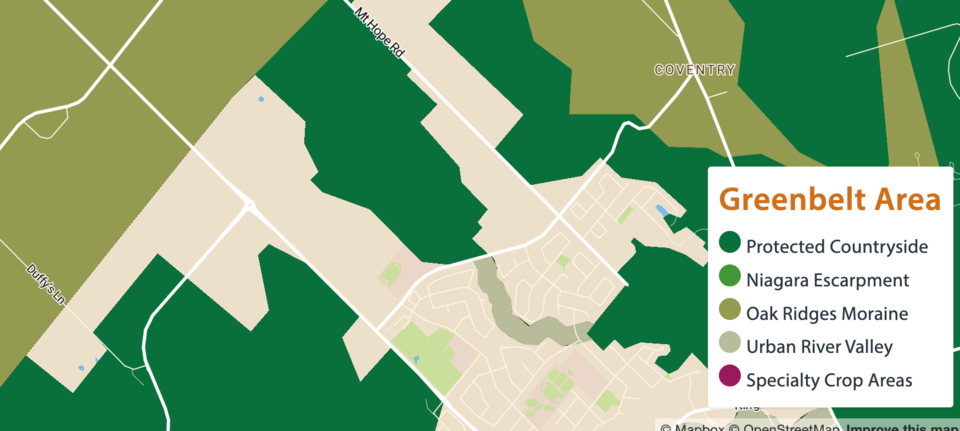
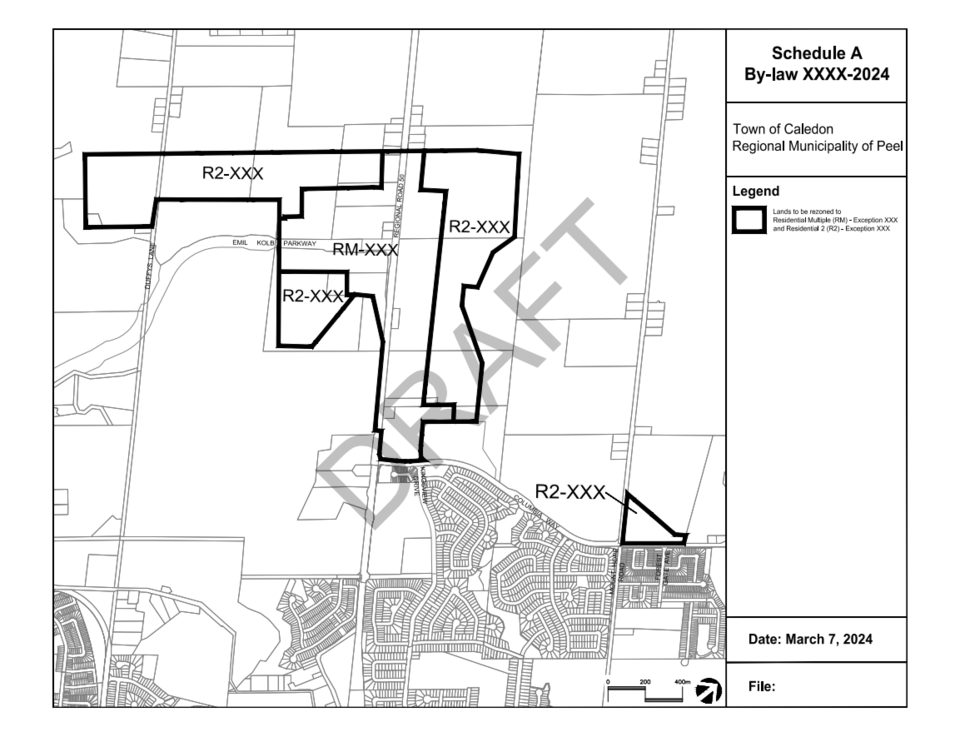
To aid their cause, the group enlisted Quinto Annibale, a land use lawyer with Loopstra Nixon who has served as a Ford government-appointed LCBO vice-chair since 2019, travelled on a government-led trade mission, and has donated more than $46,000 to the Progressive Conservatives since 2014.
In its business registry filings, the Bolton North Hill Landowners Group and Loopstra Nixon’s head office share an address.
In 2021, Annibale personally wrote a letter to Peel Region to argue the group’s case.
“There has been some suggestion by certain consultants engaged on behalf of the Region that the Proposed Expansion would negatively impact productive farmland…. In our view this is a misconception,” he wrote.
It appears the landowners have a new powerful ally on their side.
Using her strong mayor powers, Caledon Mayor Annette Groves recently proposed to bypass normal planning processes and fast-track 12 parcels of land — A1 to A12 — for residential development. The landowners’ parcel is A3.
Outside help was hired to write the 128-page draft bylaws that would rezone the 12 parcels.
That help came from Loopstra Nixon, Annibale's firm.
That relationship has raised eyebrows among residents and at least two town councillors, as Annibale stands ready to accomplish the years-long goal of rezoning the land — via bylaws he appears to have played a significant role in authoring.
"Pursuant to instructions received from Mayor Groves, please find attached to this letter a Council and Staff Direction for the information of council at the meeting of March 26, 2024," Annibale wrote in a letter to council informing them of the changes.
Residents have pushed back, hard, warning that the 35,000 housing units to be added would “radically alter the character of Caledon.” Letters warning against the changes were also sent by Peel Region and Municipal Affairs Minister Paul Calandra, who noted that six of the other 11 plots were in the way of Highway 413's proposed corridor.
Peel Region said the plan was "premature" and lacked "comprehensive planning," including studies on the watershed, servicing, transportation, stormwater, growth, and "the lack of infrastructure capacity in the existing system.”
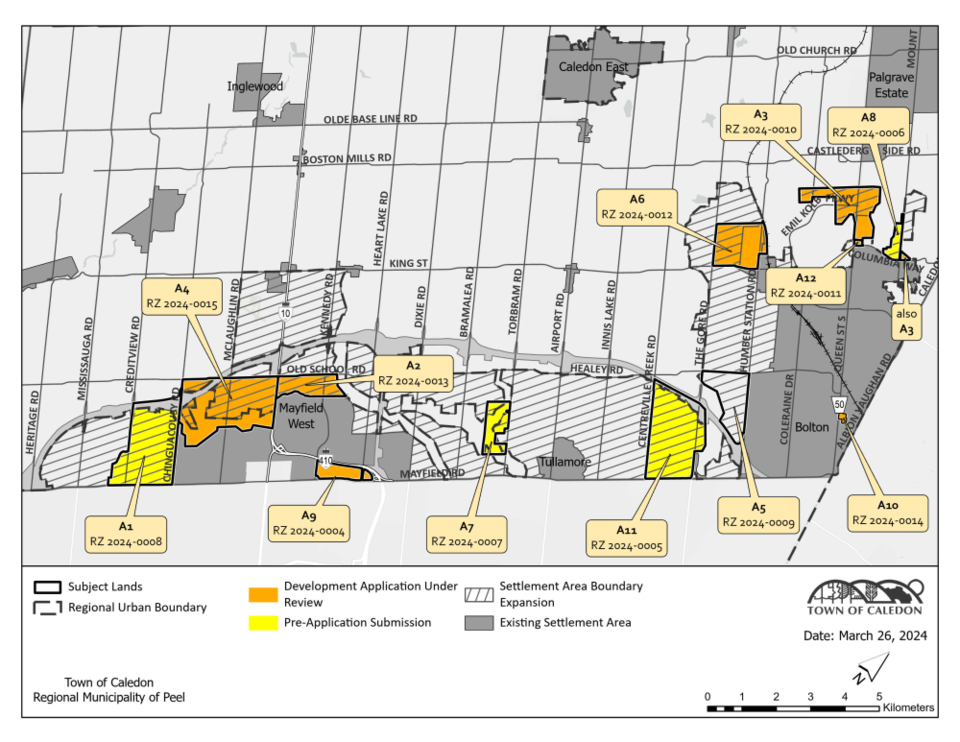
Whether it was to her constituents, the region, the province, or all three, Groves listened — halting the proposed developments until after a series of public information sessions, to be held in May and June, to more thoroughly outline her vision.
“Planning decisions involve balancing a range of considerations from many parties,” Groves said in a statement, adding that “staff has already addressed a significant majority of the feedback received” from Peel and Calandra.
Annibale has also been involved with another parcel, A7, which is more rural than A3. It’s home to a golf club, some fields, and one of the Greenbelt's "fingers" — spindly zones of protected land that wind along river corridors, meant to protect the sensitive ecosystems from development.
In September of 2022, Annibale asked the province to rezone land within A7. He did so on behalf of Mayfield Golf Club, which was bought that year by a group of developers whose names would crop up many times in the ensuing scandal, including Michael Rice and two members of the De Gasperis family.
The land was rezoned — but not for long.
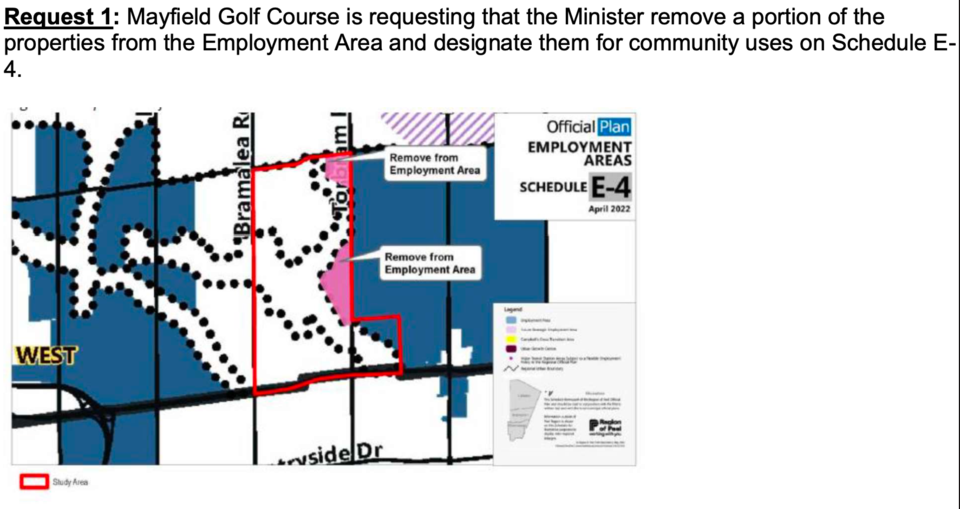
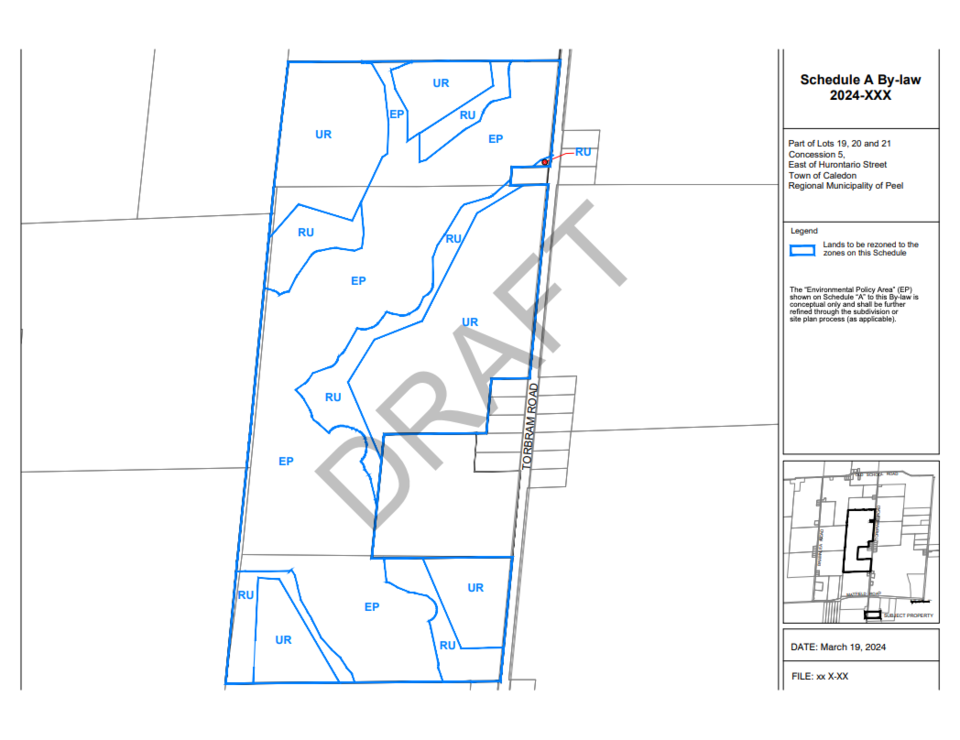
In the wake of the Greenbelt scandal, the Ford government walked back many of its land-use changes, including those in A7. However, the new housing minister, Paul Calandra, left the door open for the changes to be re-done at the behest of local councils. Caledon put in its request and, earlier this year, the land was re-rezoned under the Get It Done Act (which has yet to be proclaimed into force).
Groves’ changes to A7 wouldn’t move forward until that act is proclaimed.
It’s unclear if Annibale or Loopstra Nixon are currently on retainer with any of the landowners behind either parcel.
The Trillium spoke with an Ontario land use lawyer with extensive experience representing developers and working in the public sector, to shed light on the situation.
The lawyer said there’s nothing wrong with a land use lawyer being hired by a municipality, but that working both sides of the fence on the same matter — i.e. for a municipality and a developer seeking to get a change within that municipality — would, on its face, appear to be a fundamental conflict.
Groves’ plan to rezone the 12 parcels would require lengthy and expensive infrastructure support, including water supply, sewage treatment plants and roads. Embarking on rezoning without doing that research first is backward, the lawyer said.
At a raucous April 25 council meeting, Caledon resident Cheryl Connors asked if Loopstra Nixon currently represented any developers or landowners of the 12 parcels proposed for rezoning.
Brendan Ruddick, a partner at the firm, said that “all potential conflicts were cleared with the town of Caledon before proceeding.”
“I'm not allowed to comment on details of specific retainers, due to the Law Society rules, but we're confident there are absolutely no conflicts,” he said.
“So that answer appears to be yes,” Connors said, calling it a “monstrous conflict of interest.”
Reached by phone and asked if he had time to speak with a Trillium reporter about this story, Annibale said, "No, not for you." He gave a similar answer to each followup question. He later sent a statement via email.
"I can advise you that I have no conflict of interest with respect to any retainer for any of my clients, including the Town of Caledon. To suggest otherwise would be very incorrect and in my view libellous," he wrote, adding that he couldn't discuss the legal arrangement between himself and the town.
"Hope that helps."
Mayor Groves said she doesn't believe Annibale’s involvement constitutes a conflict of interest, noting that he is bound by Law Society of Ontario rules.
“Loopstra Nixon LLP is a leading firm in the field of municipal, land use planning and development law,” she said in a statement. “Based on their expertise and professionalism, they have a long and successful history representing municipalities, developers and public interest groups on official plans, comprehensive reviews and both minor and comprehensive zoning bylaws.”
Two Caledon councillors said they felt Annibale's involvement undermined public confidence in the plan. They did not make a formal allegation of conflict.
Ward 2 representative Dave Sheen said he was "very surprised" when he learned about Annibale’s involvement with the landowners.
"Given how contentious these applications were likely to be, I would have expected that any hint of a conflict would have been avoided," he said in a statement.
Lynn Kiernan, who represents Ward 1, said Annibale should have declared a conflict of interest.
"I think in Mr. Annibale's position, in a professional light, that if there's the appearance (of a conflict), you need to err on the side of caution," she said. "I come from the background of financial services and you cannot be too careful."
Kiernan said she saw Annibale in person for the first time in March.
"I didn't know who he was, and none of the council colleagues I spoke to seemed to know who this man sitting at the staff table was. He was not even introduced," she said.
"I would say that's unusual.”
Sheen said he agrees with Peel that the rezoning plan is premature.
"The unanswered question from hundreds of people in the community: why?" Kiernan said. "If this is such a great deal for Caledon, why has it come forward in this capacity?... And why is it coming forward with strong mayor powers, with little to zero communication to all of council?"



